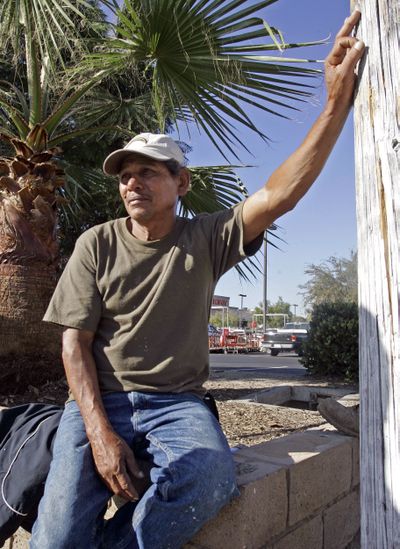Job loss reversing immigration surge

SAN DIEGO – After struggling just to pay his $300 monthly rent and send money to his wife and two children back in Honduras, Dionisio Urbina has given up. The day laborer is saving for a one-way plane ticket home.
“I lost hope about finding work,” the 54-year-old illegal immigrant said outside a Home Depot store as he entered his fourth straight week without a job. “I’m homesick. It’s best to leave.”
Thousands of Latin American immigrants both legal and illegal are going back home as the economic crisis in the U.S. causes jobs to dry up in the construction, landscaping and restaurant industries.
The flow of immigrants back across the border tends to be cyclical, with many people going back home for the Christmas holidays. But some authorities say they are seeing a bigger-than-usual reverse-immigration effect this year.
Mexico City’s municipal government predicts between 20,000 and 30,000 immigrants above the usual number will return from the U.S. in the next few months because they cannot find work.
Mexican consulates in California and Chicago report that around 4,000 more Mexican immigrants than usual have already left for Mexico City because of the economic crisis.
There are other signs the U.S. is no longer the magnet it was a few years ago, when the economy was thriving and the housing boom produced plenty of work:
•Fewer immigrants are getting caught crossing U.S. borders illegally. The Border Patrol said it made 723,825 apprehensions in the fiscal year that ended Sept. 30, down 18 percent from last year and down 39 percent from nearly 1.2 million in 2005.
•Immigrants are sending less money home. Remittances by Mexicans living in the United States registered their biggest drop in August since record-keeping began 12 years ago. Mexico’s central bank said they fell 12 percent from August 2007.
With an estimated 12 million illegal immigrants in the U.S., the number returning home is relatively small.
The vast majority of Mexican immigrants who have lived in the U.S. a few years will stay put because the job prospects are far worse back home and they have family in this country, said Wayne Cornelius, director of the University of California, San Diego’s Center for Comparative Immigration Studies.
“They would be condemning themselves to a lower standard of living,” Cornelius said.
Karina Corona, who came to the U.S. on a fake passport in 1995, is struggling to make ends meet but said she won’t go home to Culiacan, Mexico, because there is no work there and her hometown is a hotbed of drug violence.
The single mother had to quit a second job as a seamstress to care for her children, leaving her to live on about $1,500 a month as a delicatessen cashier. She stopped taking graphic design classes at a San Diego community college and fell behind on rent.
But Mexico “would be even worse than here,” said Corona, 34. “We’re going to stick it out.”
At a day laborer site in Laguna Beach, south of Los Angeles, Juan Pacheco, 48, said he planned to return to Oaxaca, Mexico, in January, about two years after he came north to work construction. On an earlier stint in the U.S., he sent home $200 a week to his wife and children and bought a house in Mexico, where his family grows corn and beans.
Pacheco has worked only one or two days a week in the past year, barely enough for food and the $200 monthly rent. His voice cracks when he talks about phone calls to his 5-year-old daughter.
“She says she doesn’t remember me, that she wants me to go home so she can meet me,” he said.
Ramon Lopez has lived north of the border for 36 years, working in hotels and restaurants. But he recently returned to Mexico with his wife and mother-in-law because he could not find work or pay his bills.
“I had my lows, I had my highs, but ultimately, things have become critical,” he said in Tijuana. “There’s too much pressure for the rent, for food, for transportation.”